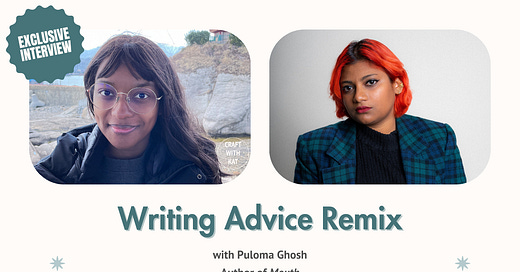“Write when it calls to you, live when it doesn’t."
Writing Advice Remix with MOUTH author Puloma Ghosh
Welcome back to Writing Advice Remix, the interview series where we remix common writing advice for practical application. I’m so excited to share our first interview with a short story writer. Puloma Ghosh is the author of Mouth1, a beautifully disturbing short story collection. You may remember Mouth from last year’s holiday gift guide as the perfect gift for loved ones who relish all things surreal and uncanny. I first met Puloma at Tin House’s online workshop in 2021. We immediately bonded over all things Kpop and BTS, and finally got to meet in-person in Seoul two years later. She joins us today to share her three-step process for getting unstuck in a writing project.
As always, you know what to do: take anything that’s useful to you and your writing life, and leave everything that’s not behind.

1. What’s the worst piece of writing advice you’ve ever heard? What problem is it supposed to solve? And why is this advice actually unproductive?
“Write everyday” is a mantra that I heard a lot when I was first starting out. I can’t pinpoint exactly where I heard it because it’s something that’s repeated everywhere by so many people. By extension, the idea that you should force yourself to write when you don’t want to, or when the words don’t come easily. The problem this is supposed to solve is, I think, to brute force your way through periods where you are uninspired, stuck in your work, or busy with other things and have to be intentional about making space for writing. The more time I spent writing, the more I realized that a writing practice is not one size fits all, and that simply putting words on a page for the sake of it is not always productive. More problematic to me is the way it frames your work as a product rather than a creative practice and thoughtful, meaningful art. It also assumes a certain type of person who even has time and energy to sit down to write every day — one perpetuated by able men of a certain class, who don’t have the necessities of work, children, the unavoidable needs of your life and body.
2. Now that you’ve written, revised, and published your book, how would you reframe that advice into something that’s actually helpful for writers?
Write when it calls to you, live when it doesn’t. As much as we want to believe that what we do is important, writing, especially if you write fiction like me, does not need to be done with any urgency. Even if you want to hop on a publishing trend, and worry you will miss some opportunity, it’s difficult to predict and impossible to guarantee that your work will be picked up and added to that space. Nobody is actually waiting for your book. Rather than disheartening, this should be freeing. In order to create the best work, be patient with yourself. Inspiration will not strike while you’re staring at a blank sheet of paper. Take a walk, read, see your friends, have conversations with people who challenge you. The answer to the blocks in your work are out in the world. I love to use words like marinate, simmer, but really I mean, just think. And when your vision is clear, you’re bursting with the need to say something, record something, make time in your life to write. It will feel easy and fulfilling. And if that moment never comes, if you yourself can’t be excited about the work, then how can you expect a reader to be excited by it? Move on to the next thing.
And if you are a person who must, every time, tie yourself to the chair, drag yourself in front of the page, reconsider whether this pursuit is for you. If there is not the absolute, implicit love for writing even when it can be difficult, puzzling, frustrating, then why are you forcing yourself?
The practical problem this solves, I suppose, is “writer’s block,” a concept I don’t really believe in because it implies that writing is some kind of assembly line or project management issue; what I hope it can solve is how to make your writing practice soulful and energized, and therefore meaningful.
3. What are three concrete steps a writer can take to incorporate this revised advice into their writing process?
First, when you’re stuck, ask yourself these questions, and answer honestly:
A. Is my vision of what I want to write clear right now?
B. What is stopping me from moving forward in my work?
C. Does writing feel like a practice or a chore?
A will tell you if your current project is energized or inert, B will help you form answerable questions about your work, and C will tell you whether it’s time to step away.
Next, ask yourself why you’re writing this. If the answer is, to publish, dig deeper.
Finally, take this, and all advice, with a grain of salt. Writing practice is not one size fits all. I am not asking you to do what I do when I’m feeling uninspired or unable to write, I’m asking you to discover your own practice, and connect with your work in a way that’s most authentic to you. Maybe you do want and need to write everyday. That’s okay too.
4. Let’s talk about Mouth. How did you integrate this advice into your own writing process?
My book, Mouth, is a collection of speculative short stories that are dark, surreal, and sensual. It took me years to write some of these stories. Some of them I drafted in days. I found in the process of writing them that the best work happened when I stopped pressuring myself to produce, and started following my own instincts and desires. I love writing, possibly more than any other thing. I learned that even when I let go, allowed myself weeks without writing a word, inevitably, when the moment was right, I would sit down to it again.
5. Looking beyond this specific piece of advice, what's the most important lesson you've learned about craft that you’d like to share with early career writers?
Craft is something we can go in circles about at nauseum, but ultimately, nobody does it the same way, and not everything works for everyone. Don’t overthink it. Write in the way that makes you feel the most joy and love.
Puloma Ghosh is the author of the short story collection, Mouth. Her work has appeared in One Story, Cake Zine, No Tokens, Book of the Month's Volume Ø and elsewhere. She has received fellowships from Tin House and Bennington College. She lives in Chicago.
Where to Find Puloma Ghosh:
So far, we’ve gotten two takes2 on why “write every day” is classist advice. Does anyone out there write every day? How does writing every day help you get unstuck in a project?
If you don’t write every day, what are your strategies for maintaining momentum in your projects?
Let’s chat in the comments:
Until next time,
Kat
This post includes affiliate links. I may receive a commission if you make a purchase through these links. Purchasing books through the Craft with Kat Bookshop supports the free writing resources I share here on Substack.
Check out our interview with Kyla Zhao if you haven’t already!





I recently started using these writing tracking charts I made. They're basically calendars where I check off the dates I've written, regardless of word counts. My goal is to write at least 3 days a week. If I write every day in a week, I get a special treat! But I don't feel bad about any days I don't write.
Right now, I do try to write everyday as I draft a new project. I have a very low threshold, 100 words, to meet and then I’m done for the day. Most times, I go over that. For me, it helps me get to the page; otherwise, I’ll let everything else push writing to the side.
Also with my work goals shifting to something more 9-5 throughout the whole year, I feel like this summer will be my last relatively free summer for a while, and I’m trying to take advantage of this time.
But this is certainly a privilege, and I think it works because this is a new project that I’m excited about. I need words on the page. However, when I do go to revising, my goal posts will change to word count to page count.
It’s the season I’m in. That counts, too. And this is one project that I’ve worked extensively on since finishing a manuscript back in 2022. I’ve had my time of living and thinking. Now it’s time to write.